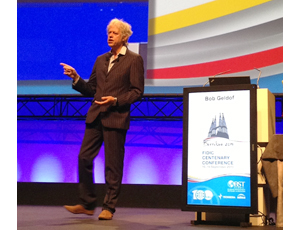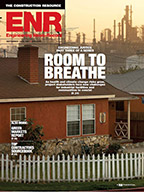
Marking its centennial, the International Federation of Consulting Engineers (FIDIC) is now "more relevant than ever," said outgoing President Geoff French at the global group's annual conference, held on Sept. 15-16 in Barcelona.
Engineers have for decades lamented their modest influence on big development decisions. But with climate change raising the public profile of environmental issues, things are changing.
The 1,200 attendees at the centennial conference of the International Federation of Consulting Engineers (FIDIC) in Barcelona want more say in project decisons.
Multilateral banks and funds “are considering more and more that sustainability should be introduced from the very early stages of the project,” said Pablo Bueno, FIDIC’s new president, who also is CEO of Madrid-based design firm Tecnica Y Proyectos SA (TYPSA).
But the industry’s voice “is not very well heard,” he added. “When you invest in thinking before you start spending, [that’s] the best way to utilize resources.”
With about 1,000 staff in Spain and a similar number abroad, TYPSA ranks at No. 128 on ENR's list of the Top 150 Global Design Firms. About $152 million of its total 2012 revenue of $223.2 million is outside of Spain.
More Influence
Bob Geldof, the Irish rock musician, author and responsible development activist, warned the 1,200 delegates from 90 countries that notions of sustainability were "delusional" and that "the planet will run out of everything."
He urged delegates to "take what you can do, this great ability ... and influence those you may consult with and work with."
With the world's population forecast to approach 10 billion by 2050, "the challenges we face are greater than ever," said French, also formerly chairman of design firm Scott Wilson until its acquisition, in 2010, by URS Corp. "We continue to behave as though we have more than one planet at our disposal."
Mike Harcourt, former premier of British Columbia Canada and currently an environmental activist, said engineers are “absolutely essential to the planet’s survival.”
But to be influential in development decisions, “we need to reform the education and formation of engineers…to participate more intelligently in the political process,” added Peter Guthrie, professor of engineering at the U.K.’s University of Cambridge.
To promote engineers’ earlier and wider involvement, FIDIC is among advisors in a World Bank review of its project procurement strategy.
 |
| Vink |
It’s no longer enough for firms to be technically qualified for bank bid lists. “You need to look at a whole range of skill sets,” he said. A revised procurement draft is set for release next year. “It could be a watershed for the globe,” said Vink. “The World Bank is a relatively modest investor but it has a huge amount of influence.”
For the Next Century
Now representing design-firm associations in about 100 countries with nearly one million members, Geneva, Switzerland-based FIDIC has grown from the group of three that launched it in Belgium in 1913.
"FIDIC's main purpose is to develop best practices around the world as quickly as possible," French added.
The federation maintains a suite of construction-contract forms that are used globally and has worked to end unethical practices in the global industry.
In Barcelona, FIDIC introduced its so-called Sustainability Pack, which provides new manuals for firms and owners to implement sustainability practices on infrastructure projects. The package, which also includes a white paper on meeting new urban challenges, was co-developed by the European Federation of Engineering Consultancy Associations.
The timing of design-firm procurement and the continuing practice of selection based primarily on bid prices were among the conference's hot topics.




Post a comment to this article
Report Abusive Comment